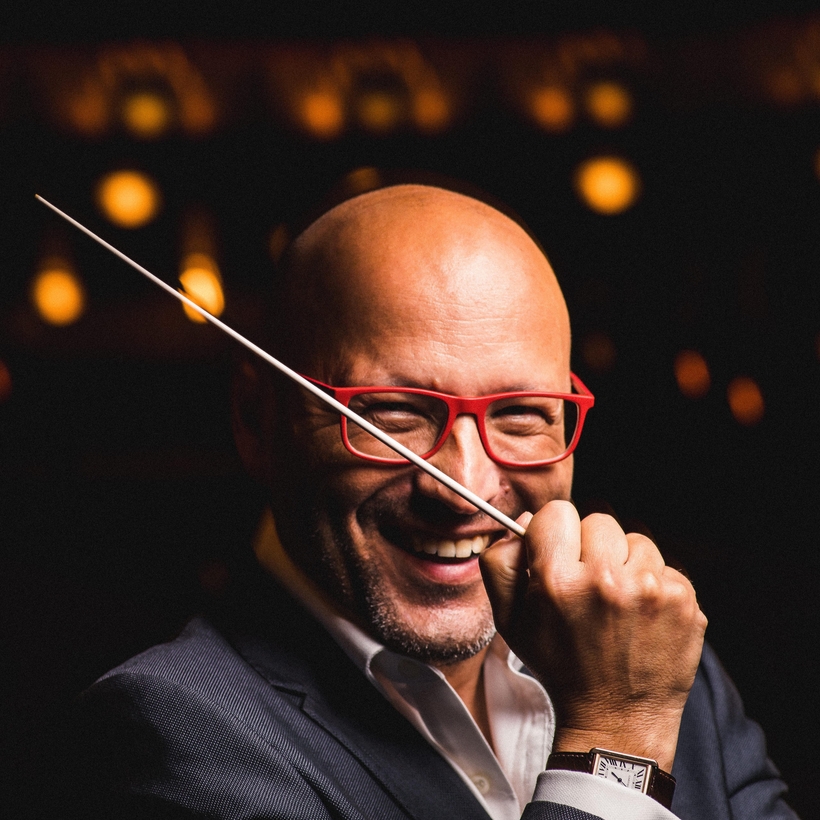An arts institution needs a face, and in Enrique Mazzola, with his shaved cranium, red-framed glasses, and missionary zeal, the Lyric Opera of Chicago has acquired a figurehead who combines the necessary cachet and talent. Already a favorite with local audiences from guest appearances and pandemic activities, he now begins his official reign as music director—only the third in the company’s nearly seven-decade history—with back-to-back productions of Verdi’s Macbeth and Donizetti’s L’Elisir d’Amore.
“But I’m not in Chicago only to present Italian repertoire,” Mazzola says on Zoom from Glyndebourne, his accented English eager and idiomatic. “Lyric Opera has to speak to all of Chicago’s communities.” That includes, along with the legacy audience, lots of new recruits. “And we must speak in the languages of our community,” he continues, ticking off English and Spanish. “No one owns opera,” he insists. “Opera belongs to everybody.”
A music director’s bedrock responsibility is to hone technical standards and a cohesive aesthetic, not least through repertory and casting choices. But Mazzola’s most visible presence will be on the podium, conducting six of eight annual productions. His lineup over his tenure includes, alongside the expected Italian specialties, a broad assortment of French and German classics as well as contemporary titles.
Diversity in casting, timely subject matter, and fresh theatrical approaches are high personal and institutional priorities. “If you respect the dramaturgy and really dig into the story,” Mazzola says, “every opera can be sung in T-shirt and blue jeans.”
In his 50s, Mazzola speaks from longer experience than one might suppose. His life in opera began at Milan’s fabled Teatro alla Scala in 1979, when Claudio Abbado picked him out of the children’s chorus for the heart-tugging part of Marie’s son in a revival of Alban Berg’s Wozzeck. The boy’s forlorn little voice is the last one we hear as he rides his hobbyhorse into the woods, where playmates have found the corpse of his mother.

“I really didn’t understand what was going on in that creepy finale,” Mazzola says. “I just absorbed the terror, the panic. Later, in the chorus in Pagliacci, I watched Nedda get murdered 15 times, and I really believed that she was dying every night. ”
“Everything I felt as a boy came back to me this year when we filmed a pandemic Pagliacci for the Lyric Opera Web site. I wonder how it will hit me next month when I conduct Macbeth.” His role in that one was another spine-tingler: the Third Apparition, a crowned child who holds a tree in his hand and evokes looming disaster as if it could never be.
That head start notwithstanding, Mazzola took no shortcuts in his professional preparation. After studying violin and piano, he enrolled at the venerable Conservatorio di Musica “Giuseppe Verdi,” also in Milan, back when the conducting track took 10 years, beginning with 7 years of composition, including theory and analysis. In year four, a candidate had to produce, in 36 hours, the first movement of a symphony. No way to cheat. The professors handed out the musical themes on the spot. Same drill with an operatic scene in year 7 and a string quartet in year 10.
“If you respect the dramaturgy and really dig into the story, every opera can be sung in T-shirt and blue jeans.”
“They locked you into your room with a key,” Mazzola says. “I brought my pajamas, lots of music paper and pencils, and a small bed.”
Was it ever his dream to make his name as a composer? “Never,” Mazzola answers. “I studied composition to learn. The job of a conductor is the result of many years of different studies that give you your tools, your knowledge, your authority, a global view. All the rest is not conducting.”
Since graduating, in the mid-90s, Mazzola has proved himself internationally across a galaxy of symphonic and operatic repertoire—familiar, arcane, and fresh from the hands of living composers. Along the way, he has made it his business to bring listeners with him through the spoken word as well as through music. In a series of a dozen short videos on Verdi’s little-known Attila for the Lyric Opera of Chicago Web site, he walks through the score number by number. No worries if you don’t read music. You can still follow the contours of the notes on the page as you look and listen, swept up in the maestro’s enthusiasm.
“My generation cannot think of a conductor as a distant legendary figure, closed in a bubble,” Mazzola says. “Our job is to share information, to create a community. That’s the way for us to make legends today.”
Matthew Gurewitsch writes about opera and classical music for AIR MAIL. He lives in Hawaii

